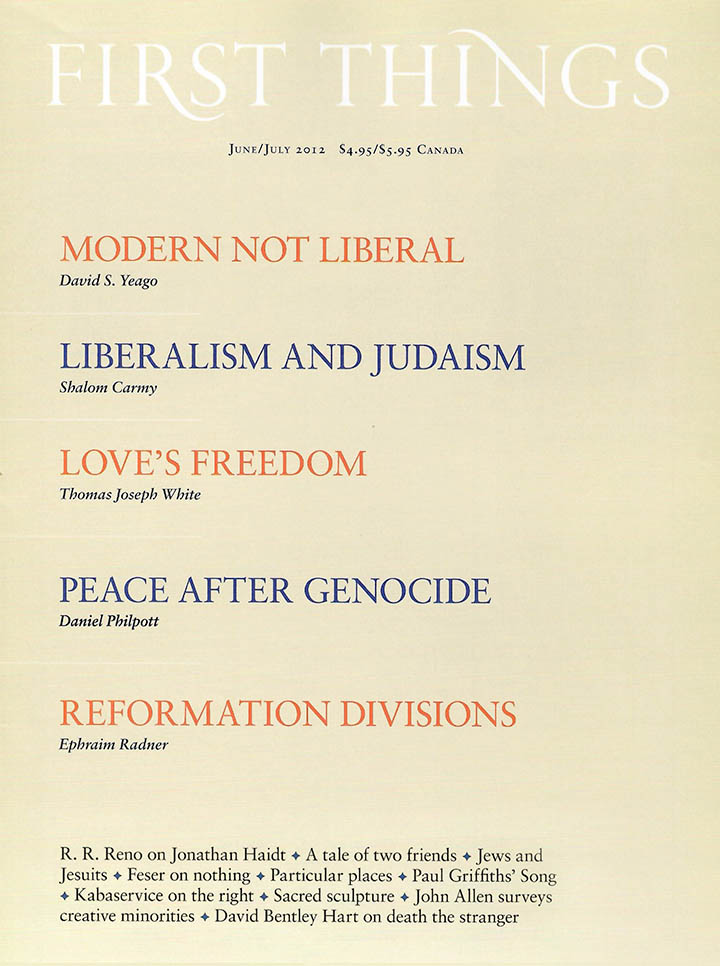Tradition and the Rule of Faith in the Early Church:
Essays in Honor of Joseph T. Lienhard, S.J.
edited by Ronnie J. Rombs and Alexander Y. Hwang
Catholic University of America, 351 pages, $39.95
n
Fr. Joseph Lienhard made his name sorting out the theological positions in the Arian controversy, and went on to make major contributions to the understanding of Augustine and to scriptural exegesis and preaching in the early Church. His abiding concern, found in his little classic The Bible, the Church, and Authority (1995), is to understand what the Fathers called the “rule of faith.”
Lienhard teaches theology at Fordham University, but his work has played a significant part in the growing appreciation of both Protestants and Catholics for the Fathers and particularly for patristic exegesis. This significance is witnessed to by the editors of this festschrift, one Catholic and one Presbyterian, and their ecumenical cast of contributors, who come from such varied places as Ave Maria and Trinity Evangelical Divinity School, Notre Dame and Dallas Theological Seminary.
The sixteen contributors review Lienhard’s work on the early Fathers, the Arian controversy, Augustine, and the reception of the Fathers themselves. A highlight of the first is Everett Ferguson’s word study on “tradition” from the New Testament to the fourth century, showing that “actual word usage does not support the modern distinction between Scripture and tradition, nor the identification of tradition with unwritten transmission.”
Sara Parvis’ essay on Marcellus of Ancyra demonstrates the continuing influence of Lienhard’s categorization of thinkers during the Aryan controversy, while First Things contributor Brian Daley’s essay on Meletius of Antioch underscores the often-overlooked basic unity of thought among the different fourth-century parties. The book also offers several intriguing essays on Augustine’s understandings of time, happiness, and the redemptive work of Christ. The final section includes Frederick Van Fleteren’s evaluation of the better and worse ways Augustine has been assimilated by the Christian West and two chapters on the ups and downs of Origen’s reputation, highlighting Erasmus and Henri de Lubac.
A good festschrift is a wonder of some sort. Tradition and the Rule of Faith in the Early Church is a fitting tribute to a priest-scholar who has striven to be fully Catholic and whose legacy is, not surprisingly, utterly ecumenical.
n
” David Paul Deavel is associate editor of
Logos: A Journal of Catholic Thought and Culture.
nn
Design for Liberty: Private Property,
Public Administration,
and the Rule of Law
by Richard A. Epstein,
Harvard, 248 pages, $29.95
n
Richard Epstein, professor of law at New York University and one of America’s foremost right-leaning legal scholars, clarifies which economic rights we possess and how best to protect them in his new book, Design for Liberty . Epstein’s thesis about “the current world malaise” is that “the protections of private property have eroded. The massive expansion of the public sector has in turn placed heavy demands on public administration, which can be met only by widespread disregard of the rule of law,” which demands “neutrality, generality, clarity, consistency, and prospectivity.”
Defending a classically liberal conception of the state that is neither dogmatically libertarian nor a stepping stone to the progressive welfare state, he explains the problems as results of the progressive movement’s opposition to “theories of government that stressed the dominance of private property, individual liberty, and limited government.” State regulators exercising too much arbitrary discretion directly violates individual rights and undermines the stable expectations necessary for private economic actors”businesses”to grow. They employ more people, provide better goods at lower prices, and generally increase quality of life more effectivley than government.
Particularly helpful are the many illustrations of how capricious government regulation ends up being captured by the rich and powerful to protect their interests. Sold as “protection” for the poor and weak, state intervention results in rent seeking, blocked access to new entrants in the market, and various other anti-competitive measures that ultimately hurt the least well-off.
In fact, Epstein structures his argument in explicitly utilitarian terms, contrasting it with principled libertarianism (which he mistakenly labels “natural law”): The greatest outcomes for all result when we empower a state to perform certain critically important tasks but strictly limit its public administration by forcing it to respect property rights and the rule of law. Capricious regulations from HHS, captured by the interests of Planned Parenthood, do not fit this description.
n
”Ryan T. Anderson, a member of First Things ’ Advisory Council,
is William E. Simon Fellow at the Heritage Foundation.

